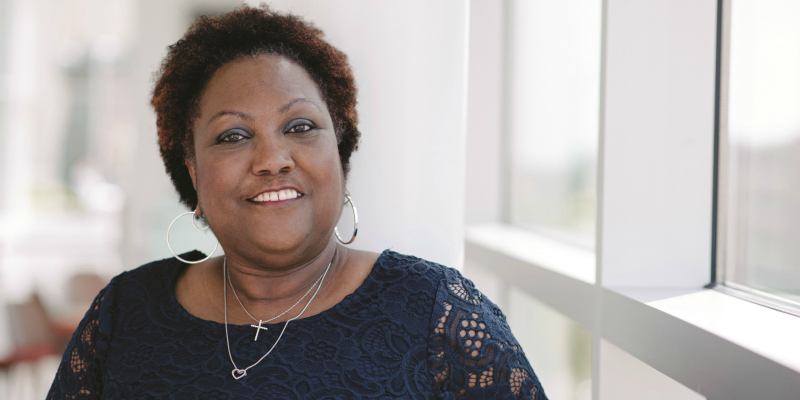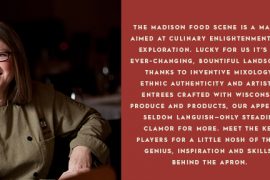By Julia Richards | Photographed by Hillary Schave
Just after graduation season we may think of idealism as embodied by young people seeking to make a difference in the world. But don’t discount the AARP set. They’ve got years of experience and perspective to help solve the challenges facing our community today. In our Thrive After 55 series we feature women who are energized by lifting others up and who aren’t stopping anytime soon.
Annie Weatherby-Flowers
It’s hard to know where to begin in describing the impact Annie Weatherby-Flowers, 59, has had on the community. Weatherby-Flowers, who holds a master’s degree in adult education, has found the most satisfaction in work that directly empowers people. As a clinical substance abuse counselor her clients included pregnant women struggling with crack/cocaine addiction. Over the years she fostered close to 40 at-risk kids, many of whom she’s still in touch with and whose own children now call her “Nana.” At her church, Fountain of Life, she runs two support groups, one for people in recovery, one for women whose lives have been broken in some way. There’s also the Martin Luther King Day celebrations she’s organized at the church. But perhaps Weatherby-Flowers’ most far-reaching impact is the 28 years and counting that she’s been organizing Madison’s Juneteenth, a celebration of black history, culture and freedom.
Juneteenth, held annually on the Saturday closest to June 19, the date of emancipation in Texas, brings all of the black community together. The theme of this year’s event was black resilience. With food, music and tents dedicated to church, kids, youth and heritage, Juneteenth is a relaxed, alcohol-free space for people to socialize with their neighbors.
Before Weatherby-Flowers moved to Madison in 1989, she worked as a community organizer in Milwaukee. In a conversation with a colleague about the differences between the two cities she identified Juneteenth as something missing in Madison. She created a nonprofit called Kujichagulia, which is the Swahili word for self-determination, for the purpose of organizing the annual celebration. Self-determination is one of the principles of Kwanzaa, a celebration of African heritage that takes place at the end of the calendar year.
From working as a community organizer to substance abuse counseling to co-owning a former local bar, R Place, Weatherby-Flowers is connected to many different circles in the community. “She has really crossed all kinds of strata and boundaries,” says Fabu, Madison’s poet laureate emeritus, who has long volunteered at and promoted Juneteenth. “Madison’s black community was segregated geographically, socially, economically,” says Weatherby-Flowers. “And we still have tiers of African-Americans…But on Juneteenth we’re all the same. There’s no clear separation because everything that happens at Juneteenth applies to them because that is our shared history, shared legacy,” she says.
Fabu organized Juneteenth’s heritage tent for 10 years. She says Weatherby-Flowers let her be “wildly creative,” and over the years she organized a quilt exhibit, baking contest and book giveaway focused on black settlers in Wisconsin. “It’s so important to our community. It’s the largest gathering of African-Americans in Madison,” Fabu says.
Cultivating a sense of community is important to Weatherby-Flowers because it sustained her through challenging times in her own life. Her schooling was interrupted when she had her first child at age 15. The support of her mother, grandmother and mentors at church and school helping her move forward when her education was derailed.
Just as she was helped when she needed it most, she was always taught to help others as well, and has passed those values on to her own two sons and now to her grandchildren. She tells her grandchildren that all Madisonians are their neighbors. “They may not live next door in our neighborhood, but they’re still our neighbors,” she says. “That’s what my mother taught me.”
Weatherby-Flowers says this inclusion is needed in Madison’s black community. On game days in the fall when she sees throngs of red-clad Badger fans, representing generations of camaraderie, she notices that the faces are mostly white. “No one is telling our kids ‘you are Badgers’ or ‘you are better than the best,’” she says. This sense of pride and belonging could be cultivated in the wider community as well. “We are Madisonians,” Weatherby-Flowers says. “Not, ‘You’re an Allied Drive resident’. No. ‘I’m a Madison resident.’”
When Weatherby-Flowers looks at issues of race in Madison she says, “The biggest thing we haven’t gotten over is how slavery defined black folks.” There’s a residual legacy from being seen for so many years as less-than, she says. In focusing on resilience at this year’s Juneteenth, Weatherby-Flowers sought to bring attention to not only the historic struggles, but also the historic, as well as modern-day strengths of black colleges, black churches and families.
Annie Weatherby-Flowers continues to find new ways to give of herself. Just a year ago she started a new position with Madison Public Library as Community Engagement Coordinator. As the library system continues to grow, she’s looking at the big picture to make sure it’s reaching all segments of the community.
In all of her efforts, Annie Weatherby-Flowers’ years of experience are an asset. “I’m a rabble rouser, because I come from community activism, social justice, so if I see something that needs to be different, I say something, or I speak out or I coalition-build because that’s what I’ve been doing for 30-something years. It’s a natural piece of who I am.”
Read about more inspiring women in our Thrive After 55 series here: Mary Fulton, Ruth Robarts.




